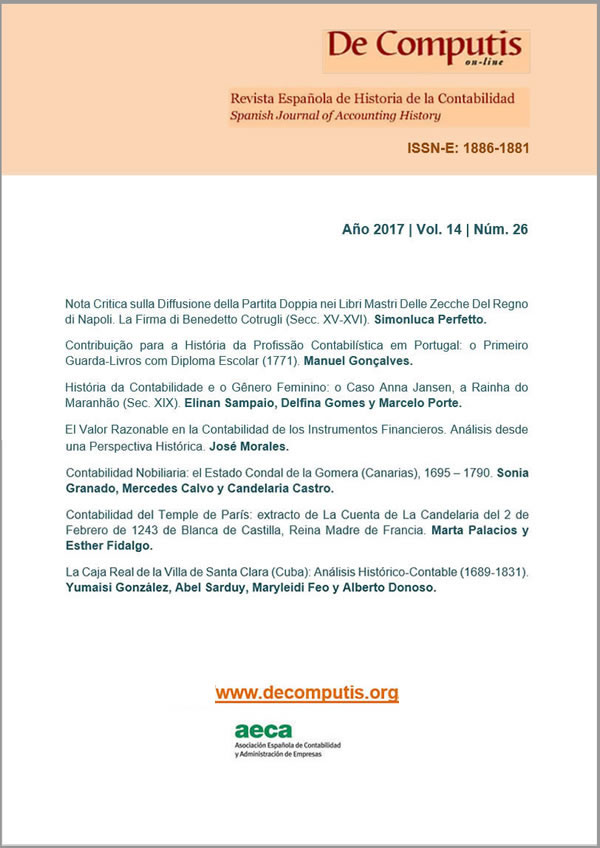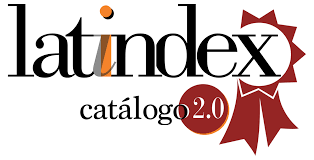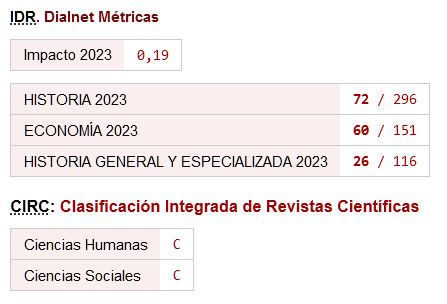História da contabilidade e o gênero feminino
o caso Anna Jansen, a rainha do maranhão (Sec. XIX)
DOI:
https://doi.org/10.26784/issn.1886-1881.v14i26.306Palabras clave:
Gênero Feminino, Emancipação, História da Contabilidade, Período Colonial, BrasilResumen
Este trabalho tem como objetivo analisar e compreender a atuação de Anna Joaquina Jansen à frente dos
negócios da família sob a perspectiva da pesquisa do gênero feminino em história da contabilidade. Para tanto, o
período compreendido por esta pesquisa foi o século XIX, tendo como ponto de partida o ano do casamento de
Anna Jansen com o Coronel Izidoro Pereira, 1822, encerrando-se em 1869, ano de seu falecimento.
O enquadramento teórico utilizado na investigação é retirado da literatura que explora os conceitos de
gênero e contabilidade, sendo também considerado o conceito de emancipação oriundo desta relação, uma vez
que a contabilidade, enquanto prática social, é capaz de atuar como ferramenta emancipatória em benefício dos
grupos sociais menos favorecidos. O presente estudo tem como principais fontes os documentos manuscritos do
século XIX, dentre os quais se tem o inventário de Anna Jansen, registros portuários, assim como solicitações
dirigidas a D. Pedro II.
Mediante a análise dos manuscritos e dos jornais da época foi possível constatar que Anna Jansen se
tornou detentora de uma das maiores fortunas da região ao ficar viúva, e por meio desta fortuna conseguiu atingir
lugar de destaque na sociedade maranhense. Sua atuação representa um romper dos paradigmas que tendem a
anular a participação feminina em atividades econômicas e políticas, e levou ao seu reconhecimento como uma
mulher muito à frente da época em que viveu. Embora não se tenha conhecimento de registros técnicos mantidos
por Anna Jansen ao longo de sua vida, constata-se por meio dos documentos primários analisados que possuía
grande destreza para a administração das suas propriedades e seus bens.
Descargas
Citas
Abraham, A. (2008). The struggle to develop accounting practices in the Australian Girl Guides, 1945-9: a microhistorical approach. Accounting History, 13(1), 101-120. https://doi.org/10.1177/1032373207083928
Abranches, D. (1992). O Cativeiro. São Luís: Lithograf.
Abrantes, E. S., & Santos, S. R. R. (2011). Ana Jansen: a mulher e o mito. In Y. Costa & M. C. Galves (Eds.), Maranhão: ensaios de biografia & história (pp. 53-76). São Luís: Café & Lápis.
Almeida, J. C. F. (2008). Entre engenhos e canaviais: Senhoras do açúcar em Itu (1780-1830). Tese de Mestrado. Universidade de São Paulo.
Bacellar, C. A. P. (1990). A mulher em São Paulo colonial. Espacio,Tiempo y Forma, IV, 367-386. https://doi.org/10.5944/etfiv.3.1990.3229
BCB. (2007). Síntese dos padrões monetários brasileiros. Obtido em: 06 de Agosto de 2015, de Banco Central do Brasil: http://www.bcb.gov.br/htms/museu-espacos/S%C3%ADntesePadroesMonetariosBrasileiros.pdf.
Black, J. (2006). War, Women and Accounting: Female Staff in the UK Army Pay Department Offices, 1914-1920. Accounting, Business & Financial History, 16(2), 195-218. https://doi.org/10.1080/09585200600756225
Campos, M. H. (2008). Senhoras Donas: economia, povoamento e vida material em terras maranhenses (1755-1822). Tese de Doutorado. Universidade de São Paulo.
Carlos, A. M., Maguire, K., & Neal, L. (2006). Financial acumen, women speculators, and the Royal African company during the South Sea bubble. Accounting, Business & Financial History, 16(2), 219-243. https://doi.org/10.1080/09585200600756241
Carmona, S., Ezzamel, M., & Gutiérrez, F. (2004). Accounting history research: traditional and new accounting history perspectives. De Computis - Spanish Journal of Accounting History, 1(1), 24-53. https://doi.org/10.26784/issn.1886-1881.v1i1.239
Carnegie, G. D., & Napier, C. J. (1996). Critical and interpretive histories: insights into accounting's present and future through its past. Accounting, Auditing & Accountability Journal, 9(3), 7-39. https://doi.org/10.1108/09513579610121956
Carnegie, G. D., & Napier, C. J. (2002). Exploring comparative international accounting history. Accounting, Auditing & Accountability Journal, 15(5), 689-718.
https://doi.org/10.1108/09513570210448966
Carnegie, G. D., & Walker, S. P. (2007a). Household accounting in Australia Prescription and practice from the 1820s to the 1960s. Accounting, Auditing & Accountability Journal, 20(1), 41-73. https://doi.org/10.1108/09513570710731209
Carnegie, G. D., & Walker, S. P. (2007b). Household accounting in Australia: a microhistorical study. Accounting, Auditing & Accountability Journal, 20(2), 210-236.
https://doi.org/10.1108/09513570710741000
Carnegie, G. D., McWatters, C. S., & Potter, B. N. (2003). The development of the specialist accounting history literature in the English language. Accounting, Auditing & Accountability Journal, 16(2), 186-207. https://doi.org/10.1108/09513570310472058
Chwastiak, M. (2008). Rendering death and destruction visible: Counting the costs of war. Critical Perspectives on Accounting, 19(5), 573-590.
https://doi.org/10.1016/j.cpa.2007.01.002
Cooper, C. (2001). From women's liberation to feminism: reflections in accounting academia. Accounting Forum, 25(3), 214-245. https://doi.org/10.1111/1467-6303.00064
Cooper, K. (2008). Mary Addison Hamilton, Australia's first lady of numbers. Accounting History, 13(2), 135-161. https://doi.org/10.1177/1032373207088176
Cooper, K. (2010). Accounting by women: Fear, favour and the path to professional recognition for Australian women accountants. Accounting History, 15(3), 309-336. https://doi.org/10.1177/1032373210368422
Coutinho, M. (2005). Fidalgos e barões: Uma história da nobiliarquia luso-maranhense. São Luís: Instituto Geia.
Dias, M. N. (1970). Fomento e mercantilismo: A Companhia Geral do Grão-Pará e Maranhão (1755-1778). Belém: UFPA. https://doi.org/10.11606/issn.2316-9141.rh.1970.128994
Dingwall, H. (1999). The power behind the merchant? Women and the economy in late-seventeenth century. In E. Ewan e M. M. Meikle (Eds.), Women in Scotland c. 1100 - c. 1750 (pp. 152-162). Edinburgh: Tuckwell Press.
Ewan, E. (1999). "For whatever ales ye": Women as consumers and producers in late medieval scottish towns. In E. Ewan & M. M. Meikle (Eds.), Women in Scotland, c. 1100 - c. 1750 (pp. 125-135). Edinburgh: Tuckwell Press Ltd.
Falci, M. B. K., & Melo, H. P. (2002). Riqueza e emancipação: Eufrásia Teixeira Leite. Uma análise de gênero. Estudos Históricos, 29,165-185.
Francis, J. R. (1990). After virtue? Accounting as a moral and discursive practice. Accounting, Auditing and Accountability Journal, 3(3), 5-17.
https://doi.org/10.1108/09513579010142436
Freeman, M., Pearson, R., & Taylor, J. (2006). 'A doe in the city': Women shareholders in eighteenth- and early nineteenth-century Britain. Accounting, Business & Financial History, 16(2), 265-291. https://doi.org/10.1080/09585200600756282
Gaffikin, M. (2011). What is (Accounting) History?. Accounting History, 16(3), 235-251. https://doi.org/10.1177/1032373211405019
Gallhofer, S., & Haslam, J. (1996). Accounting/art and the emancipatory project: some reflections. Accounting, Auditing & Accountability Journal, 9(5), 23-44.
https://doi.org/10.1108/09513579610151944
Gallhofer, S., & Haslam, J. (1997). Beyond accounting: the possibilities of accounting and 'critical' accounting research. Critical Perspectives on Accounting, 8(12), 71-95. https://doi.org/10.1006/cpac.1996.0087
Gallhofer, S., & Haslam, J. (2004). Accounting and liberation theology: Some insights for the project of emancipatory accounting. Accounting, Auditing & Accountability Journal, 17(3), 382-407. https://doi.org/10.1108/09513570410545795
Gallhofer, S., & Haslam, J. (2006). The accounting-globalisation interrelation: An overview with some reflections on the neglected dimension of emancipatory potentiality. Critical Perspectives on Accounting, 17(7), 903-934. https://doi.org/10.1016/j.cpa.2005.08.007
Gallhofer, S., & Haslam, J. (2009). Emancipation In J. Edwards & S. P. Walker (Eds.), The routledge companion to Accounting History (pp. 485-502). New York: Routledge.
Gallhofer, S., & Haslam, J. (2011). Emancipation, the spiritual and accounting. Critical Perspectives on Accounting, 22(5), 500-509. https://doi.org/10.1016/j.cpa.2011.01.006
Gallhofer, S., Haslam, J., & Waltc, S. (2011). Accountability and transparency in relation to human rights: A critical perspective reflecting upon accounting, corporate responsibility and ways forward in the context of globalisation. Critical Perspectives on Accounting, 22(8), 765-780. https://doi.org/10.1016/j.cpa.2011.07.002
Gallhofer, S., Haslam, J., Monk, E., & Roberts, C. (2006). The emancipatory potential of online reporting - The case of counter accounting. Accounting, Auditing & Accountability Journal, 19(5), 681-718. https://doi.org/10.1108/09513570610689668
Galves, M. C. (2011). Demandas provinciais nas Cortes constitucionais portuguesas: Izidoro Rodrigues Pereira, Maranhão, 1822. Anais do XXVI Simpósio Nacional de História - ANPUH, (pp. 1-11). São Paulo.
Gamber, W. (1994). Gendered concerns: thoughts on the history of business and the history of women. Business and Economic History, 23(1), pp. 129-140.
Hammond, T. (2003). History from accounting's margins: international research on race and gender. Accounting History, 8(1), 9-24. https://doi.org/10.1177/103237320300800102
Haynes, K. (2008). Moving the gender agenda or stirring chicken's entrails? Where next for feminist methodologies in accounting? Accounting, Auditing & Accountability Journal, 21(4), 539-555. https://doi.org/10.1108/09513570810872914
Hopwood, A. G. (1983). On trying to study accounting in the contexts in which it operates. Accounting, Organizations and Society, 8(2/3), 287-305. https://doi.org/10.1016/0361-3682(83)90035-1
Hopwood, A. G. (2005). After 30 years. Accounting, Organizations and Society, 30(7/8), 585-586. https://doi.org/10.1016/j.aos.2005.06.002
Hopwood, A. G., & Miller, P. (Eds.) (1994). Accounting as social and institutional practice. Cambridge: University Press.
Jacobs, K. (2011). Enlightenment and emancipation: Reflections for critical accounting research. Critical Perspectives on Accounting, 22(5), 510-515. https://doi.org/10.1016/j.cpa.2010.11.005
Janotti, M. L. M. (1996). Três mulheres da elite maranhense. Revista Brasileira de História, 16(31-32), 225-248.
Johns, L. (2006). The first female shareholders of the bank of New South Wales: Examination of shareholdings in Australia's first bank, 1817-1824. Accounting, Business & Financial History, 16(2), 293-314. https://doi.org/10.1080/09585200600756308
Kamla, R. (2009). Critical insights into contemporary Islamic accounting. Critical Perspectives on Accounting, 20(8), 921-932. https://doi.org/10.1016/j.cpa.2009.01.002
Khalifa, R., & Kirkham, L. M. (2009). Gender. In J. Edwards & S. P. Walker (Eds.), The routledge companion to Accounting History (pp. 433-450). New York: Routledge.
Kirkham, L. M., & Loft, A. (2001). The lady and the accounts: Missing from accounting history? Accounting Historians Journal, 28(1), 67-90.
https://doi.org/10.2308/0148-4184.28.1.67
Komori, N. (2007). The ''hidden'' history of accounting in Japan: a historical examination of the relationship between japonese women and accounting. Accountins History, 12(3), 329-358. https://doi.org/10.1177/1032373207079037
Komori, N. (2012). Visualizing the negative space: Making feminine accounting practices visible by reference to Japanese women's household accounting practices. Critical Perspectives on Accounting, 23(6), 451-467. https://doi.org/10.1016/j.cpa.2012.04.006
Komori, N., & Humphrey, C. (2000). From an envelope to a dream note and a computer - The award-winning experiences of post-war Japanese household accounting practices. Accounting, Auditing & Accountability Journal, 13(4), 450-474. https://doi.org/10.1108/09513570010338302
Lehman, C. (2012). We've come a long way! Maybe! Re-imagining gender and accounting. Accounting, Auditing & Accountability Journal, 25(2), pp. 256-294.
https://doi.org/10.1108/09513571211198764
Lewis, S. I. (1992). Female Entrepreneurs in Albany 1840-1885. Business and Economic History, 21(2), 65-73.
Lewis, S. I. (1995). Beyond Horatia Alger: Breaking through gendered assumptions about business "success" in mid-nineteenth-century America. Business and Economic History, 24(1), 97-105.
Licini, S. (2011). Assessing female wealth in nineteenth century Milan, Italy. Accounting History, 16(1), pp. 35-54. https://doi.org/10.1177/1032373210389591
Lima, R. M. (2006). O fio e a trama: trabalho e negócios femininos na vila de São Paulo (1554-1640). Tese de Mestrado. Universidade de São Paulo.
Llewellyn, S., & Walker, S. P. (2000). Household accounting as an interface acttivity: The home, the economy and gender. Critical Perspectives on Accounting, 11(4), 447-478. https://doi.org/10.1006/cpac.1999.0373
McNicholas, P., & Barrett, M. (2005). Answering the emancipatory call: an emerging research approach 'on the margins' of accounting. Critical Perspectives on Accounting, 16(4), 391-414. https://doi.org/10.1016/S1045-2354(03)00098-4
Milbank, J. (1990). Theology and social theory: beyond secular reason. Oxford: Blackwell Publishing.
Milbank, J., Pickstock, C., & Ward, G. (1999). Radical orthodoxy: a new theology. London: Routledge. https://doi.org/10.4324/9780203259146
Miller, P., & Napier, C. (1993). Genealogies of calculation. Accounting, Organizations and Society, 18(7/8), 631-647. https://doi.org/10.1016/0361-3682(93)90047-A
Miller, P. (1994). Accounting as a social and institutional practice: an introduction. In A. G. Hopwood, A.G. & P., Miller (Eds.), Accounting as social and institutional practice (pp.1-39). Cambridge: University Press.
Moerman, L. (2006). People as prophets: liberation theology as a radical perspective on accounting. Accounting, Auditing & Accountability Journal, 19(2), 169-185.
https://doi.org/10.1108/09513570610656079
Molisa, P. (2011). A spiritual reflection on emancipation and accounting. Critical Perspectives on Accounting, 22(5), 453-484. https://doi.org/10.1016/j.cpa.2011.01.004
Montello, J. (1985). Tambores de São Luís: a saga do negro brasileiro (5 ed.). Rio de Janeiro: Nova Fronteira.
Moraes, J. (2007). A rainha que não chegou a baronesa. In J. Moraes (Ed.), Ana Jansen, Rainha do Maranhão (pp. 7-14). Imperatriz: Ética.
Mota, A. S. (2007). A dinâmica colonial portuguesa e as redes de poder local na Capitania do Maranhão. Tese de Doutorado. Universidade Federal de Pernambuco.
Napier, C. (2006). Accounts of change: 30 years of historical accounting research. Accounting, Organizations and Society, 31(4/5), 445-507.
https://doi.org/10.1016/j.aos.2005.12.004
Northcott, D., & Doolin, B. (2000). Home accountants: exploring their practices. Accounting, Auditing & Accountability Journal, 13(4), 475-501.
https://doi.org/10.1108/09513570010338267
Novaes, I. R. M. (2012). Ana Jansen: Empreendedorismo feminino no século XIX. Tese de Mestrado. Fundação Getúlio Vargas - Escola Brasileira de Administração Pública e de Empresas.
Oldroyd, D., Fleischman, R. K., & Tyson, T. N. (2008). The culpability of accounting practice in promoting slavery in the British Empire and antebellum United States. Critical Perspectives on Accounting, 19(5), 764-784. https://doi.org/10.1016/j.cpa.2006.11.005
Paisey, C., & Paisey, N. (2006). And they all lived happily ever after?: Exploring the possibilities of mobilising the internet to promote a more enabling accounting for occupational pension schemes. Accounting, Auditing & Accountability Journal, 19(5), pp. 719-758. https://doi.org/10.1108/09513570610689677
Piorkowsky, M. (2000). Household accounting in Germany - Some statistical evidence and the development of new systems. Accounting, Auditing & Accountability Journal, 13(4), 518-534. https://doi.org/10.1108/09513570010338087
Potter, B. N. (2005). Accounting as a social and institutional practice: perspectives to enrich our understanding of accounting change. Abacus, 41(3), 265-89.
https://doi.org/10.1111/j.1467-6281.2005.00182.x
Rezende, J. D. (2012). Dona Ana Joaquina Jansen Pereira e seu nascimento. Obtido em: 10 de Junho de 2015, de Suplemento literário e cultural Guesa Errante do Jornal Pequeno: http://www.guesaerrante.com.br/2012/9/26/dona-ana-joaquina-jansen-pereira-e-seu-nascimento-3336.htm.
Rutterford, J., & Maltby, J. (2007). "The nesting instinct": women and investment risk in a historical context. Accounting History, 12(3), 305-327.
https://doi.org/10.1177/1032373207079035
Santos, W. (1978). Perfil de Ana Jansen. São Luís: SIOGE.
Schultz, S. M., & Hollister, J. (2008). The Ledger of Ann DeWitt Bevier (1762-1834), Early American Estate Manager and Mother. The Accounting Historians Journal, 35(1), 135-166. https://doi.org/10.2308/0148-4184.35.1.135
Serra, A. (1946). A Balaiada. Rio de Janeiro: Bedeschi.
Spence, C. (2009). Social accounting's emancipatory potential: A Gramscian critique. Critical Perspectives on Accounting, 20(2), 205-227.
https://doi.org/10.1016/j.cpa.2007.06.003
Virtanen, A. (2009). Accounting, gender and history: the life of Minna Canth. Accounting History, 14(1-2), pp. 79-100. https://doi.org/10.1177/1032373208098553
Viveiros, J. (2007). A rainha do Maranhão In J. Moraes (Ed.), Ana Jansen: rainha do Maranhão (pp. 15-58). Imperatriz Ética.
Viveiros, J., Montello, J., Abranches, D., Ribeiro, M. J. B., Serra, A., Moraes, J., & Lima, C. (2007). Ana Jansen: rainha do Maranhão (3 ed.). Imperatriz: Ética Editora.
Walker, S. P. (1998). How to secure your husband's esteem. Accounting and private patriarchy in the brithish middle class household during the nineteenth century. Accounting, Organizations and Society, 23(5-6), 485-514. https://doi.org/10.1016/S0361-3682(97)00025-1
Walker, S. P. (2003a). Professionalisation or incarceration? Household engineering, accounting and the domestic ideal. Accounting, Organizations and Society, 28(7-8), 743-772. https://doi.org/10.1016/S0361-3682(02)00020-X
Walker, S. P. (2003b). Identifying the woman behinde the "railed-in desk" The proto-feminisation of bookkeepping in Britain. Accounting, Auditing & Accountability Journal, 16(4), 606-639. https://doi.org/10.1108/09513570310492326
Walker, S. P. (2006). Philanthropic women and accounting. Octavia Hill and the exercise of 'quiet power and sympathy'. Accounting, Business & Financial History, 16(2), 163-194. https://doi.org/10.1080/09585200600756217
Walker, S. P. (2008a). Innovation, convergence and argument without end in accounting history. Accounting, Auditing & Accountability Journal, 21(2), 296-322.
https://doi.org/10.1108/09513570810854446
Walker, S. P. (2008b). Accounting histories of women: beyond recovery? Accounting, Auditing & Accountability Journal, 21(4), 580-610. https://doi.org/10.1108/09513570810872932
Walker, S. P. (2014). Accounting and rural rehabilitation in New Deal America. Accounting, Organizations and Society, 39(3), 208-235. https://doi.org/10.1016/j.aos.2014.01.007
Walker, S. P., & Carnegie, G. D. (2007). Budgetary earmarking and the control of the extravagant woman in Australia, 1850-1920. Critical Perspectives on Accounting, 18(2), 233-261. https://doi.org/10.1016/j.cpa.2005.10.003
Walker, S. P., & Llewellyn, S. (2000). Accounting at home: some interdisciplinary perspectives. Accounting, Auditing & Accountability Journal, 13(4), 425-449.
https://doi.org/10.1108/09513579910270129a
Wiskin, C. (2006). Businesswomen and financial management: Three eighteenth-century case studies. Accounting, Business & Financial History, 16(2), 143-161.
Descargas
Publicado
Cómo citar
Número
Sección
Licencia

Esta obra está bajo una licencia internacional Creative Commons Atribución-NoComercial-CompartirIgual 4.0.










